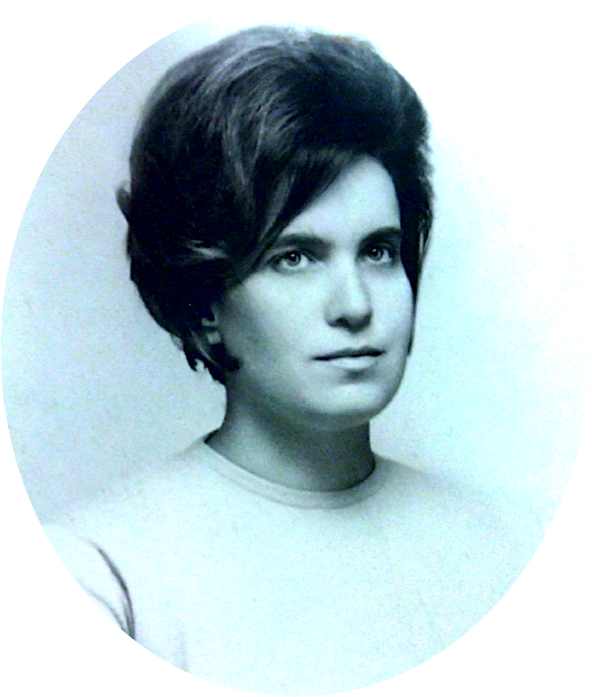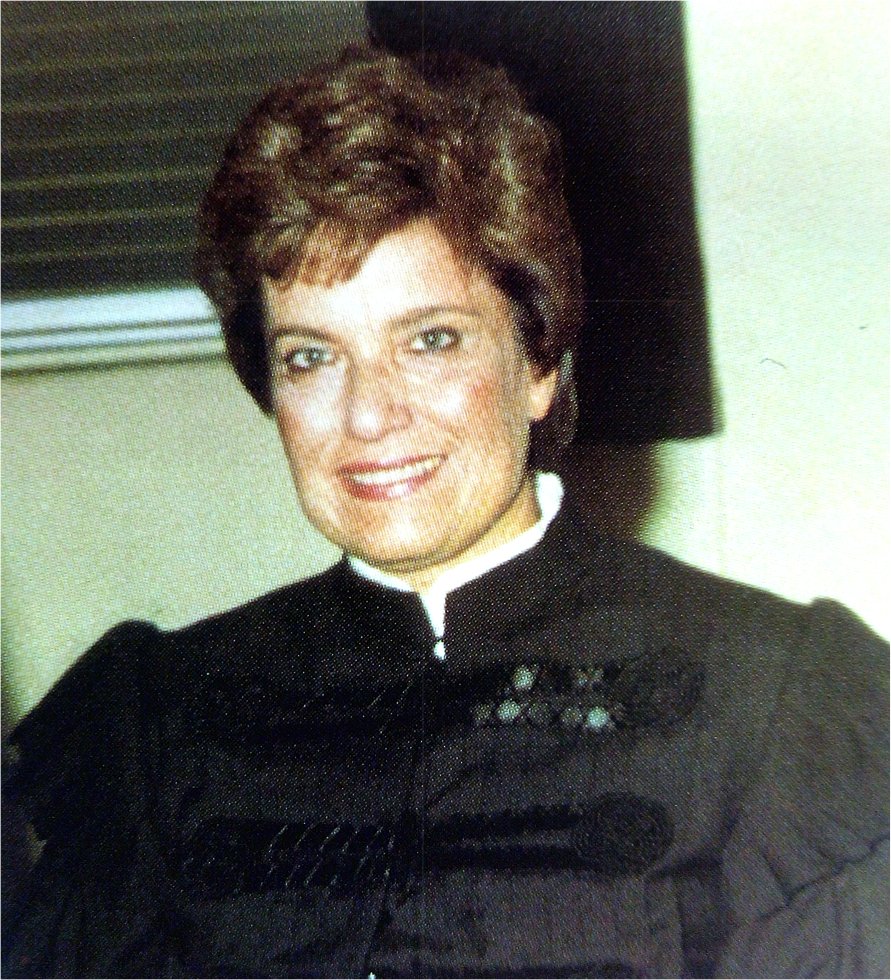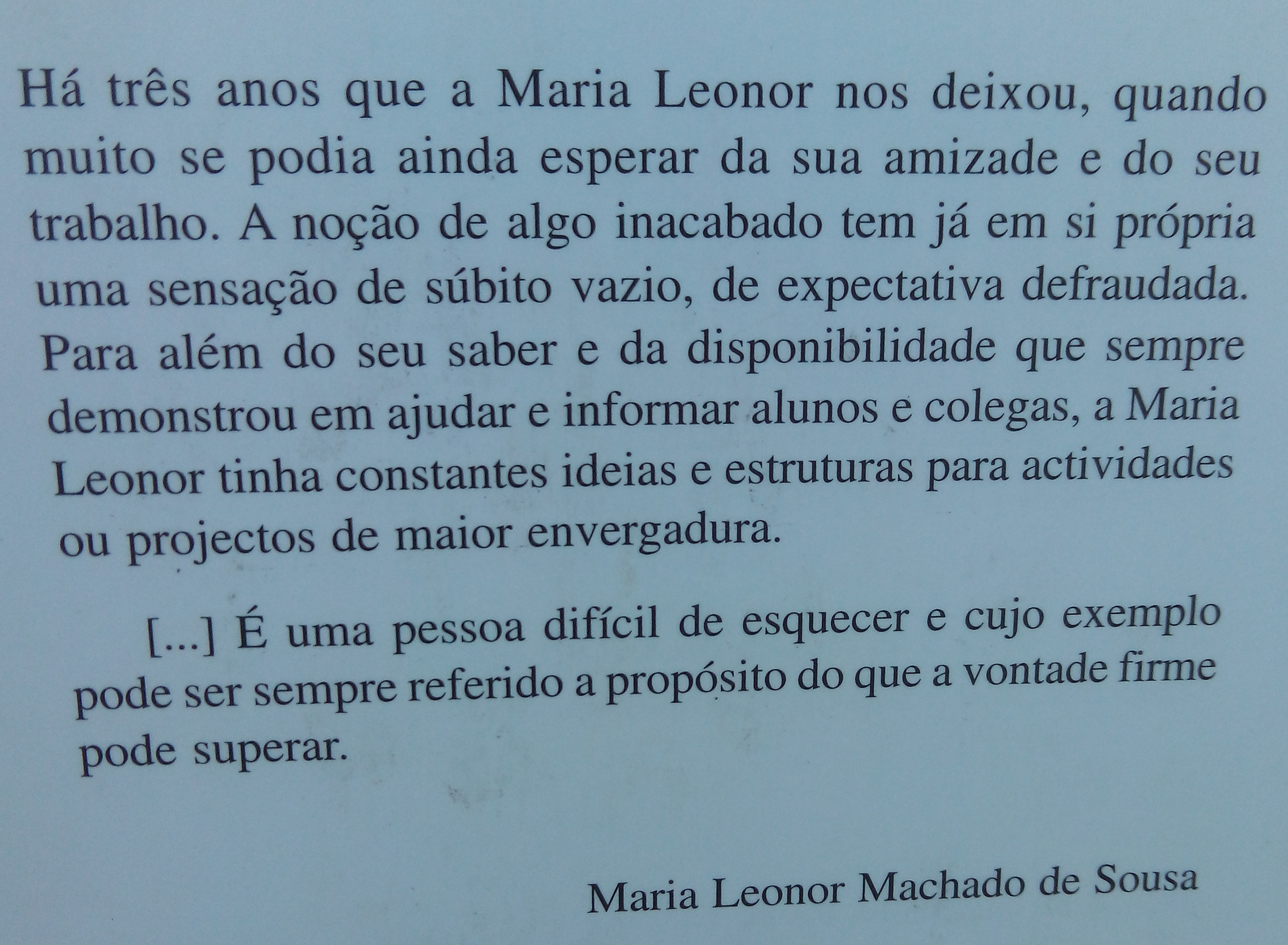

Maria Leonor de Lemos Viana Carvalhão Buescu was born in Monsanto, Idanha-a-Nova (a town located in Portugal´s Castelo Branco district), on the 24th of June of 1932.
The academic trajectory of this remarkable researcher, essayist and university teacher began to be cemented in 1955, the year in which she obtained her degree in Classic Philology from the Faculty of Letters of the University of Lisbon, having presented a dissertation entitled Monsanto: Ethnography and Language, which would be first published in 1961 and, in a slightly modified version, later in 1984.
Between 1955 and 1961, Buescu taught at various secondary schools, among them the Rainha D. Leonor, Maria Amália Vaz de Carvalho and D. João de Castro High Schools, as well as at the Lycée Français Charles Lepierre. In 1971, she ascended to the university level by joining the institution that formed her, the Faculty of Letters of the University of Lisbon, where she would teach, as an Assistant Teacher, subjects such as History of Classical Culture, History of Roman Civilization, History of Portuguese Culture and Portuguese Historiography of the Sixteenth Century, in addition to seminars such as Literary Aesthetics of the Twentieth Century, Oral Literature or Baroque Aesthetics.
In 1978, Buescu transitioned to the Faculty of Social and Human Sciences (FSHS) of Lisbon´s Nova University, where she would obtain her PhD degree, in 1981, based on a thesis entitled Grammar and Portuguese Grammarians of the Sixteenth Century: An Open Discourse, which was later published, in 1984, under the designation Babel or the Rupture of the Sign: Grammar and Portuguese Grammarians of the Sixteenth Century. In 1983, as part of the FSHS´s Teacher Aggregation tests, she presented a Program of Portuguese Literature (Classical Period) and the lesson The Pilgrimage of Fernão Mendes Pinto: A space of multiple communication, for which she received approval with the highest possible grade.
In 1985, she performed functions of visiting Professor at the University of Bristol, in the United Kingdom, and ended up being simultaneously invited, by the University of Oxford and the King´s College London, to assume the position of conference speaker at both these institutions. A year later, having already returned to Portugal, she became an Associate Teacher at the FSHS, an institution where she would also reach, in 1991, the rank of Professor. Still at the FSHS, she performed management functions, among which one can single out the coordination and presidency of the Scientific Commission of the Department of Anglo-Portuguese Studies and the position of Sub-Director of the Faculty, which she occupied between 1987 and 1990.
Mirroring what she had accomplished at the Faculty of Letters, Buescu was responsible for lecturing and coordinating a quite diversified number of subjects at the FSHS, such as Latin, History of Classical Culture, History of the Portuguese Language, Introduction to Literary Studies, Theory of Literature and Portuguese Literature (Classical), having also founded the subject of Estudos Camonianos (exclusively devoted to the study of the seminal classical Portuguese poet Luís Vaz de Camões) and having guided several Masters seminars.
In addition to her extraordinary academic career, Maria Leonor Buescu also distinguished herself for having rendered accessible the translations of Cicero, by Duarte de Resende, of Cassius Longinus, by Custódio José de Oliveira, as well as those of Virgil, by Leonel da Costa, and for her vast and pioneering research in the field of the historiography of the Portuguese language, by means of the study and publishing of Portuguese grammarians of the sixteenth century, such as João de Barros, Fernão de Oliveira, Duarte Nunes de Leão, Pero de Magalhães de Gândavo or the Father António Vieira. Among many editorial activities, she was responsible for compiling the entire body of work of Gil Vicente, for writing an edition of the History of Literature - translated into English and French - and for being the author, starting in 1965, of nearly a hundred entries included in encyclopedias and dictionaries, such as the Luso-Brazilian Encyclopedia of Culture or the Dictionary of Portuguese Literature. As a result of her efforts in this regard, she was invited to curate the exhibition The Galaxy of Languages in the Time of Expansion and to arrange the catalog associated with this event, which took place within the Celebrations of the Portuguese Discoveries.
Buescu´s endless achievements also led her to participate in various congresses, colloquiums and conferences, both in Portugal as well as abroad (in countries such as Spain, France, England, Scotland, Italy, Brazil, Romania and South Africa); to create, in partnership with Ivette Centeno, the Office for Studies of Symbology of Lisbon´s Nova University and the Studia Lusitanica magazine; to become a member of the Association of Literary Critics, of the Portuguese Association of Comparative Literature, of the John Gower Society, of the Arthurian Society and of the Societé d’Histoire et d’Épistemologie des Sciences du Langage of Paris; and to be admitted, by unanimity, to the Portuguese Academy of History, in 1998.
On a final note, one must also highlight her systematic devotion to secondary school teaching, given that she was responsible for updating textbooks that had been prepared during the 1960s and 1970s and for creating, herself, new manuals directed towards students of such stage of education.
Having left an extremely valuable legacy to Portuguese culture, Maria Leonor Buescu died on the 28th of December of 1999, in Lisbon.
*****
Maria Leonor de Lemos Viana Carvalhão Buescu nasceu em Monsanto, Idanha-a-Nova, a 24 de Junho de 1932.
O percurso académico desta notável investigadora, ensaísta e professora universitária começou a ser cimentado em 1955, ano em que concluiu a Licenciatura em Filologia Clássica, na Faculdade de Letras da Universidade de Lisboa, tendo apresentado uma dissertação intitulada Monsanto: Etnografia e Linguagem, que viria a ser publicada em duas ocasiões: em 1961, no Centro de Estudos Filológicos, e em 1984, com ligeiras modificações, pela mão da Editorial Presença.
Entre 1955 e 1961, Buescu leccionou em variadas escolas secundárias, entre as quais os liceus Rainha D. Leonor, Maria Amália Vaz de Carvalho e D. João de Castro, assim como no Lycée Français Charles Lepierre e no Externato Sagrado Coração de Maria. Em 1963, após ter dado início, no Liceu Normal Pedro Nunes, ao estágio do professorado liceal, foi aprovada nas provas de Exame de Estado, com elevada classificação. Em 1971, ascendeu ao patamar universitário ao ingressar na instituição que a formou, a Faculdade de Letras da Universidade de Lisboa, onde viria a leccionar, na categoria de Assistente, cadeiras como História da Cultura Clássica, História da Civilização Romana, História da Cultura Portuguesa, Tópicos da Cultura Clássica na Cultura Portuguesa e Historiografia Portuguesa do Século XVI, para além de seminários como Estética Literária do Século XX, Literatura Oral ou Estética Barroca. Tendo-se aí mantido, em comissão de serviço, até 1978, foi paralelamente colocada no Liceu Padre António Vieira, na qualidade de professora efectiva.
Em Outubro desse mesmo ano, transfere-se para a Faculdade de Ciências Sociais e Humanas (FCSH) da Universidade Nova de Lisboa, onde acabaria por se doutorar, em 1981, com uma dissertação intitulada Gramática e Gramáticos Portugueses do Século XVI: Um Discurso Aberto, e que foi publicada, em 1984, pela Imprensa Nacional, sob a designação Babel ou a Ruptura do Signo: A Gramática e os Gramáticos Portugueses do Século XVI. Em 1983, presta provas de Agregação na FCSH, por intermédio da apresentação de um Programa da Literatura Portuguesa (Época Clássica) e da lição A Peregrinação de Fernão Mendes Pinto: Espaço de múltipla comunicação, pelos quais obteve aprovação com a máxima classificação possível.
Em 1985, exerce funções de Professora Visitante na Universidade de Bristol, no Reino Unido, acabando por ser simultaneamente convidada, por parte da Universidade de Oxford e do King´s College de Londres, para assumir a posição de conferencista nessas duas instituições. Um ano depois, já de regresso a Portugal, torna-se Professora Associada na FCSH, instituição onde viria também a alcançar, em 1991, a categoria de Professora Catedrática.

Ainda na FCSH, exerceu funções de gestão, entre estas sobressaindo a coordenação e presidência da Comissão Científica do Departamento de Estudos Anglo-Portugueses e o cargo de Subdirectora da Faculdade, que ocupou entre 1987 e 1990.
À semelhança do que havia feito na Faculdade de Letras, Buescu encarregou-se de leccionar e coordenar um número bastante diversificado de disciplinas na FCSH, entre as quais Latim, História da Cultura Clássica, História da Língua Portuguesa, Introdução aos Estudos Literários, Teoria da Literatura, Literatura Portuguesa (Clássica), tendo ainda fundado a cadeira de Estudos Camonianos e orientado vários seminários de Mestrado, destacando-se o de Análise das Fontes e Crítica Literária e o de Literaturas Clássicas e Portuguesa Comparadas.
Paralelamente à sua extraordinária carreira académica, Maria Leonor Buescu notabilizou-se também por ter tornado acessíveis as traduções de Cícero, por Duarte de Resende, de Longino, por Custódio José de Oliveira, e as de Virgílio, por Leonel da Costa, e pela sua extensa e pioneira investigação na área da historiografia da língua portuguesa, através da publicação e estudo de gramáticos portugueses do séc. XVI como João de Barros, Fernão de Oliveira, Duarte Nunes de Leão, Pero de Magalhães de Gândavo ou o Padre António Vieira. Entre diversas ocupações de foro editorial, foi responsável pela compilação de todas as obras de Gil Vicente - tendo inclusivamente publicado, em apêndice, o Auto da Festa - redigiu uma edição da História da Literatura - traduzida para inglês e francês - para a Europália, publicada através da Imprensa Nacional, e foi autora, a partir de 1965, de cerca de cem verbetes incluídos em enciclopédias e dicionários, designadamente na Enciclopédia Luso-Brasileira de Cultura, na Biblos - Enciclopédia Verbo das Literaturas de Língua Portuguesa, no Dicionário de Literatura Portuguesa, no Dicionário de Eça de Queiroz e no Dicionário do Romantismo Literário Português. A este respeito, foi convidada, em 1992, para comissariar a exposição “A Galáxia das Línguas na Época da Expansão” e preparar a edição do catálogo associado a este evento, inserido no âmbito das Comemorações dos Descobrimentos Portugueses.
Entre muitos outros méritos complementares, participou em numerosos congressos, colóquios e conferências, quer em Portugal, quer no estrangeiro (em países como Espanha, França, Inglaterra, Escócia, Itália, Brasil, Roménia e África do Sul); fundou, em parceria com Ivette Centeno, o Gabinete de Estudos de Simbologia da Universidade Nova de Lisboa e a revista Studia Lusitanica; foi membro da Associação de Críticos Literários, da Associação Portuguesa de Literatura Comparada, da John Gower Society, da Arthurian Society e da Societé d’Histoire et d’Épistemologie des Sciences du Langage de Paris; e foi admitida, por unanimidade, na Academia Portuguesa da História, em 1998.
Releve-se ainda, numa nota final, a sua sistemática devoção ao universo do ensino secundário, na medida em que se responsabilizou pela actualização de manuais escolares elaborados durante as décadas de 60 e 70 e pela própria criação de novos livros direccionados aos alunos deste ciclo de estudos. A sua preocupação por esta área era de tal ordem significativa que acabou por coordenar, no seu departamento da FCSH, as disciplinas da Didáctica do Português, com uma frequência quase ininterrupta.
Tendo deixado um valiosíssimo legado à cultura portuguesa, Maria Leonor Buescu morreu em Lisboa, a 28 de Dezembro de 1999.

References: